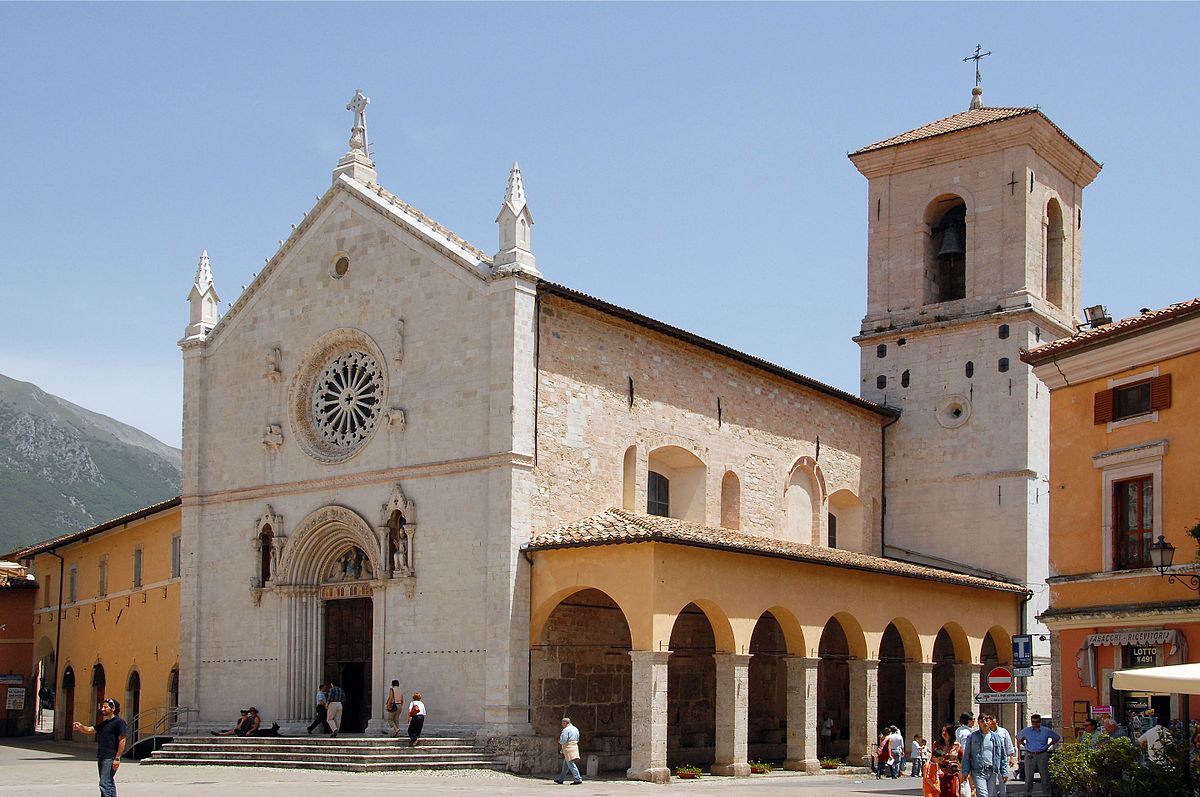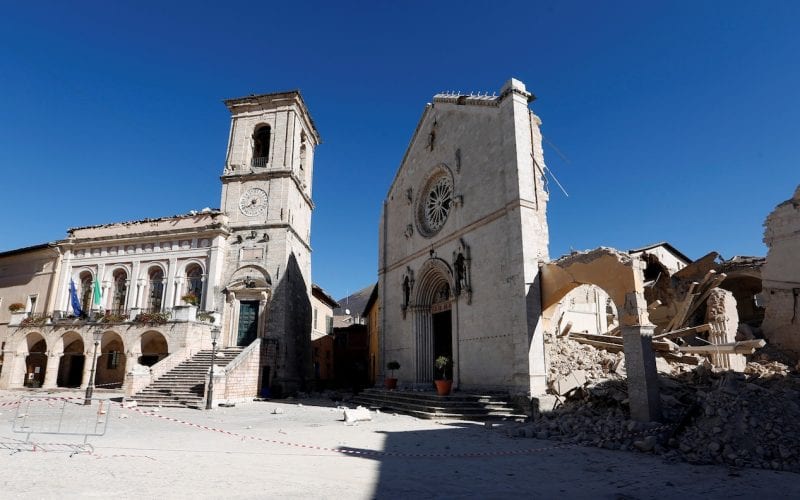I Just Visited Nursia, Two Years After the Earthquakes
I visited the monks of Nursia. Here's what happened.

For months, I’ve been planning a men’s pilgrimage to Norcia, known to most Americans as Nursia. The pilgrimage was for the men’s group at St. Mark’s Catholic Community in Vicenza, Italy. Nursia is the first on a three-stop pilgrimage to accompanying Assisi and Bologna. Dubbed the “Founders Pilgrimage,” we would see the origins of the founders of three of the Church’s largest and most influential religious orders (Benedictines, Franciscans, and Dominicans). But the first stop is Nursia, and I’ve been looking forward to this in particular for some time.
Before the planning even started, I had wanted to see this ancient town. If you weren’t aware, it is the birthplace of Sts. Benedict and Scholastica, founders of Western monasticism. Of course also, I’ve had the desire to see Nursia since reading of the devastating earthquake in 2016. If you don’t remember, the entire region that Nursia sits in was rocked in two successive earthquakes in August 2016. The first provided great concern to the stability of structures in the area, and within days those concerns were realized with the collapse of over 350 buildings as the second earthquake struck. Many of these where churches and other structures nearing foundations in the Middle Ages. So, when I arrived in Italy just a year later, I felt as though I had just missed my moment to see the popular and famous Basilica of St. Benedict, built over the site of his birth home. The basilica was destroyed with the second earthquake, with just one wall still standing.
Here's what it looked like before:

And here’s the morning of the earthquake:

I took a little drone footage to show what it looks like today. I would say “enjoy” but this it devastating. Please pray as you watch:
There was also controversy in Italy in the weeks leading up to the earthquake. Just two months prior, Italy passed its first laws allowing same-sex unions. Some speculated on the coincidence that the two events were so close together.
But Italy has seen numerous earthquakes, and the faithful monks who operate the basilica lost nearly everything in the wake. It’s demanding, on my conscience at least, to think of the monks and the community, first. The American Benedictine monks who enjoy success in giving spiritual retreats and hospitality to pilgrims (while also brewing what have become a world-famous beer) were forced to sleep in tents and having to essentially start over much of the work they were already deeply invested in.
With that said, planning this pilgrimage for fourteen men, just to Nursia, came with a real amount of anticipation and responsibility. But the ride in to the mountains that surround Nursia was anything but enjoyable—it was downright humbling. Almost immediately after entering the area I noticed building after building, ruined; either with a missing wall ending in a pile of rubble, or a caved in roof, or a building unrecognizable for any imagination. Even as we passed through small townships, we took sight of partially collapsed housings, cleared zones where it is apparent a large building once stood, and houses abandoned. It was a different scene that I had imagined, even two-and-a-half years later.
It was also, somewhat, familiar to me. I was stationed at Keesler Air Force Base in Biloxi, Mississippi, when Hurricane Katrina hit. We stayed in Dolan Hall, on base, for over two days waiting for the storm to come, to pass, and for the area to be cleared for re-entry. Three days later they asked for a team of volunteers to help clean up the base and community, forgoing progression in tech school. My friends and I didn’t even hesitate, and stepped forward. And what I saw changed my life. It looked like a bomb went off. And six months later, it didn’t look much different. I went back a couple years later, and little had changed.
In Nursia, they’re still cleaning up. I saw an entire roof that was rotated about 45 degrees and falling off the wall that held it up. Entire sections of the massive and thick walls surrounding the city center were missing or crumbled. Entire sections of town were still red-taped: no entry. And not a single church in town was still standing. If this event occurred in ancient times, what the Romans and other cultures would have done is either abandon the town and start over elsewhere, or bulldoze everything, cover it with dirt, and build on top of those foundations and walls. Thank God it’s 2019 and we know how to restore, reuse, and preserve.
So, rather than staying in town, I got an agriturismo (like an Italian bed and breakfast) a couple miles otherwise of town on the foot of the mountains that overlook the valley and Nursia. What’s cool is that the Nursian Benedictine monks are stationed just 100 meters from where me and the guys stayed.
About 2 p.m., Father Cassian walks down the hill to greet me, and he was every bit as gracious as he appears on PBS and EWTN. After a short but thoroughly enjoyable beer tasting, we joined the monks for the prayer of None, then confession time, and Vespers. When I say we “joined them” it was, for me, a Lay Dominican who prays the office each day, more of a moment of “oh my gosh this is so ridiculously cool—you’re supposed to be praying, Shaun—but it’s in Latin and I can’t keep up!—and they sound so amazing.” And soon, a treat to everyone: a dinner in total silence while one of the monks read from a book. It just so happened that the book being read was a historical piece on the military chaplains of the Civil War. The guys, including our own Catholic chaplain who was in attendance, were much pleased I imagine.
Later was Compline, and then we went to our agriturismo. I dearly hope that I will never forget the monks chanting, perfectly, the Ave Maria Caelorum towards the end of Compline in a wooden chapel where only four candles were lit, not including the sanctuary lamp. The monks turned to the corner wall in perfect unison and posture, but to me, as they sang, their heads appeared tilted as though they were begging for the intercession of Our Lady, serenading the Blessed Virgin herself. In a way, they were.
The next morning before Mass it was arranged for Father Cassian to come to our breakfast table to share a short message. He discussed the cardinal sins and cardinal virtues, and explained from the wisdom of a religious order deeply rooted in exorcisms, that since the entire world is engaged in constant spiritual battle, we must be on constant guard and prepare to know, serve, and love our true king if we wish to emerge victorious. For sure, the group of men who have deployed and have well-over a century of combined service, received the tutorial and message with appreciation.
Then it was Mass. For nearly all of the men, it was their first Tridentine Mass. They had been told for three months that Mass would be in Latin, and it would be in the Extraordinary From. Undeniably, it was extraordinary. During what I knew was the consecration, I noticed a monk go out a door and I wondered where he was headed in the middle of Mass. None of my business, I know! Then came the moment of lifting and presenting the sacrifice and the bells rang, solid, lurid, and with such supremacy over the moment that I had no choice but to weep a little with my chin trembling on my interlocked fists. It was, surely, one of those moments in my Faith where the Real Presence was so manifest, I could not hold in my appreciation.
Of course the food in Nursia was delicious, too. The Norcini pasta and boar’s sausage are an ace to any appetite. The guy at the local sfusi (imagine a shop that pumps wine like a gas station) would not stop giving us tastes and free bottles, and the other locals were extraordinarily courteous and welcoming.
We left to Assisi, said the Stations on the hill of San Damiano church, and saw the rest of the beautiful churches and landmarks there. Then proceeded to Bologna, where we stayed just meters from the private cell of St. Dominic, ascended the 666 porticos to observe the madonna painted by the Evangelist Luke, and toured the largest church in Italy, St. Petronius. But on the next day as we shared our last lunch together, it was not the beer tasting or the souvenirs or the great architecture and holy relics we saw that made an impression on the men. Everyone was asked for their opinion on “the moment” that meant the most for them. The overwhelming answer was “the monks of Nursia.” Who can disagree? Not even the violence of the foundations of the earth can hold back these holy men from being entirely dedicated to their community, their faith, and their beer. Okay, I added beer in hopes that you would smile.
But the monks of Nursia need your prayers, and your help. Please consider a donation, generous if you can make it. Use this link to make your gift offering. Please also do not forget to pray for them, often.












